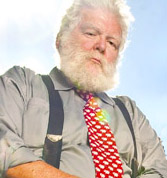A state Court of Appeal has ruled that small-town California newspaper publisher Tim Crews does not have to pay legal fees to a school board he sued over his public records request. The unanimous decision (see Court of Appeal’s opinion below) represents a crucial victory for government transparency and a welcome success for the First Amendment Coalition, which was instrumental in organizing and underwriting Crews’ successful defense.
“The appeals court’s decision makes clear that, in deciding whether to go to court to contest an agency’s denial of your request for public records, you will not have to fear a crushing penalty,” said Peter Scheer, FAC’s executive director. “If the court had decided differently, no journalist or ordinary citizen would ever again file suit to enforce the PRA, for fear of being bankrupted by a court order to pay a penalty of tens of thousands of dollars.”
Scheer added: “That would have been a disaster, not just for Tim Crews of course, but for government transparency in general.”
The case grows out of a public records request filed by Crews, publisher of the Sacramento Valley Mirror in Glenn County, an agricultural community in Northern California. The request sought emails of the superintendent for the Willows Unified School District. Crews was investigating whether the district was using school resources to influence a political campaign (a line of inquiry that ultimately did not pan out).
The school district began delivering copies of the emails the day after Crews filed suit. It also withheld several thousand emails on various grounds. A Superior Court judge ruled in the district’s favor after reviewing the withheld emails. The court not only dismissed Crews’ PRA suit, but then took the highly unusual step of ruling that Crews’ case was frivolous and on that basis ordering him to pay the district’s legal fees–an amount that was ultimately set at $56,000.
The Appeals Court, while agreeing with the dismissal of Crews’ PRA suit, squarely rejected both the finding that the case was frivolous and the resulting order to pay the district’s legal fees.
The Court emphasized that a fee award is a form of “punishment [that] should be used most sparingly to deter only the most egregious conduct.” Failing to prevail in a PRA lawsuit, by itself, is never enough to justify a fee award. The Court said a suit could be found “frivolous” only if filed in bad faith–for example, “to harass” an agency rather than to obtain information–or if the suit’s legal basis is so implausible that “any reasonable attorney would agree” it is “totally without merit.”
Under the appeals court’s interpretation of the PRA, a plaintiff and her lawyer, when deciding to sue to gain access to records, don’t have to be confident that they will prevail. Even if they expect to lose, they can file a suit without fearing a crushing penalty in the form of an award of legal fees.
The court said: “Counsel and their clients have a right to present issues that are arguably correct, even if it is extremely unlikely that they will win.”
FAC became involved in Crews’ defense after he was ordered to pay the district’s legal fees. FAC helped Crews in lining up legal representation–his attorney for the appeal was Karl Olson (of Ram, Olson, Cereghino & Kopczynski in San Francisco).
Also for the appeal, FAC took the lead in organizing amicus brief support for Crews. Two amicus briefs were filed, one brief on behalf of media companies (prepared by Duffy Carolan and her colleagues at Davis Wright Tremaine) and another on behalf of pro-access government officials (prepared by Terry Francke of Californians Aware).
“For us, Tim’s case was absolutely make or break,” said Scheer. “The only means of enforcing the PRA is through civil suits that challenge agencies’ withholding of requested records,” he said. “If Tim’s penalty had been affirmed, that would have been the end of PRA enforcement.”
The cost of Crews’ representation was substantially underwritten by FAC’s Rebele Legal Fund, a special fund for open-government litigation named for FAC Board member Rowland (“Reb”) Rebele, the founding (and biggest) contributor to the fund. (Other major contributions were made by Raymond Pryke, Susan McClatchy and Allen McCombs, among others.)
The Rebele Legal Fund provides funding support for important open-government and first amendment cases in which, for a variety of reasons, pro bono (i.e., free) legal representation may not be available. Normally the fund is for cases in which FAC, by action of its Board of Directors, has decided to participate as a party.


One Comment
want my comrades to know that this was the man and editor and newspaper operator who helped me when the Fish and Game Wardens molested me and the Constitution for National Geo’s Wild Justice cameras. Acting as my own attorney and advocate I won against them in at least 50% of possible ways. I could not have done this without Tim Crews’ support. Simply knowing someone else KNEW what we were crying out about, and furthermore CARED, helped to keep the coals on the fire. I am terribly glad he won, because he won for all of us. Any court could have ruled against any of us in such a way for our PRA’s. I was glad it was Tim and the First Amendment Coalition that had to take the appeal on. Thank you Tim, First Amendment, and Calaware for all that you do and say and ignite and extinguish! God Bless you!!!!!
Comments are closed.